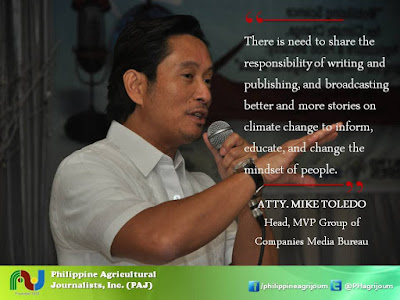Submitted by Vox Bikol on Mon, 08/10/2015 - 22:55
LEGAZPI CITY, Aug.
9 (PIA)–-Government communicators and members of the media in Bicol who
were interested in agriculture and the science of climate change went to a
workshop conducted by the Philippine Agricultural Journalists, Inc.(PAJ), the
leading group of journalists and information officers in the country who cover
agriculture.
The workshop was held last July 31
and Aug. 1 at Ninong’s Hotel in this city and was attended by journalists from
print, TV, radio and government information officers.
Dubbed “Climate Change: Gets Mo Na
Ba?,” the event provided participants “science-based” information on climate
change, agriculture, food security and human safety, the techniques in data
interpretation and planning on information dissemination.
The thrust, according to PAJ
president Roman F. Floresca, was to help journalists craft better and more
science-based stories about the issues of climate change.
The global climate change, described
by the National Aeronautics and Space Administration as the accelerated warming
up of the Earth, has generated low media reportage, according to an online
report of one of the workshop organizers, the Philippine-based International
Rice Research Institute.
The IRR report said numerous
scientists and experts around the world have expressed their concern at media
discussions on climate change that “lack accurate information or are too
technical for the public.”
“We aim to laymanize climate change
processes and terminologies and enable journalists in the Bicol region to
write, publish and broadcast better and more stories (about the matter),” said
Floresca, also the business editor of Philippine Star.
The discussants underscored the
impact of climate change on agriculture and food security and the critical role
of journalists in enriching public understanding on the matter.
International Rice Research
Institute (IRRI) communication head Tony Lambino recommended writing stories
that depict the “positive, hopeful and reformist” side to the climate change
because they ”can more likely lead to progress.”
Two of Lambino’s examples were rice
varieties ready for climate change conditions such as drought, rising sea
level, heavy floods and intense heat; and success stories of farmers who were
able to propagate and gain increased yield through “climate smart farming
strategies.”
“Positive and hopeful news make
readers think that they can do something,” he said. “(This thinking) can prompt
them to be inspired and take action.”
Philippine Network of Environmental
Journalists (PNEJ) president Imelda Abaño tackled the state of climate change
reportage. She expressed concern at the low
media reportage on science, the communication gap between scientists and
journalists, and the lack of resources of the media to report science.
For journalists who struggle to
report climate, her advice was to understand the science of climate change, go
beyond press releases, get the right news sources and report more on the human
factor of climate change.
“We need more stories on gender
dimension taking into account its impact on men and women, indigenous peoples,
the plight of our farmers, following the money such as the people’s survival
fund and champions of CCA and DRR,” she said.
By CCA and DRR, she meant climate
change adaptation and disaster risk reduction.
At the workshop, the participants
tried to prove their enhanced skills in climate change news reporting by
crafting articles regarding the higlights of the event.
Some of the participants even shared
their personal insights and observations and offered measures to implement
climate-related initiatives, programs and advocacies.
The event was supported by
Department of Agriculture, Metro Pacific Investments Corp., Smart
Communications, Philex Mining Corp., CGIAR Research Program on Climate Change,
Agriculture and Food Security in Southeast Asia, World Agroforestry Center and
IRRI.
(EAD/SAA/PIA5/Albay)
- See more at: http://www.voxbikol.com/article/20150810/bicol-reporters-take-newsroom-workshop-climate-change#sthash.3pOJFMsQ.eMEFBaIR.dpuf












